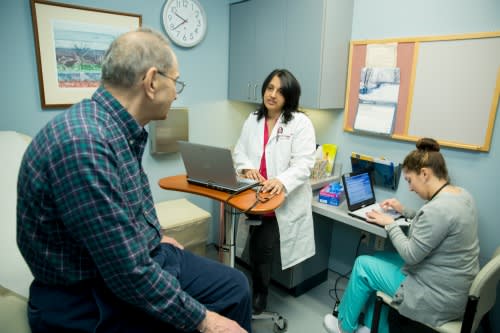By Barbara Nadolny, RN, CDE
World Diabetes Day is celebrated on November 14. So let’s all join together as a community to increase awareness of the effects and complications caused by all types of diabetes. After all, this unfortunate disease impacts both young and old.
Truth be told, some of us may not be fully aware of the types and causes. Here’s a basic breakdown: Diabetes is a disease of the pancreas. 90% of people with diabetes have Type 2 in which the pancreas neither makes enough insulin nor properly uses the insulin made. Risk factors include family history, being overweight, being inactive, increasing age, and individuals with certain ethnic backgrounds. Most people do not see obvious symptoms of Type 2 diabetes, so visiting your health care provider for routine blood tests is a necessary step.
Type 1 Diabetes—sometimes known as Juvenile Diabetes—is more common in children but can actually be diagnosed at any age. The disease is caused by an autoimmune response in the body and the pancreas will suddenly stop making insulin. Only 10% of people with diabetes have Type 1.
If you think you may be at risk, watch out for the following symptoms: increase in thirst, frequent urination, blurry vision, unintentional weight loss, vaginal yeast infections and non-healing wounds.
The bad? According to the American Diabetes Association, 30 million children and adults have diabetes nationwide. Another 86 million have pre-diabetes and are at risk for developing Type 2 Diabetes. And if diabetes is not kept under control, certain complications can arise. These can range anywhere from heart attack and stroke, kidney failure, vision loss due to diabetic retinopathy, nerve damage, and in some cases, amputations. Nearly one-third of the people who have diabetes are unaware that they have it. Furthermore, it’s the seventh-leading cause of death in the United States.
The good? There is hope and treatment. Controlling diabetes can help reduce your risks of complications. Learning about diabetes self-management and working closely with your health care provider will help you control this disease.
Our Certified Diabetes Educators and Endocrinology team sees you as a whole person, not just as a patient with diabetes. Your needs and opinions matter to us. That’s why we work with you individually to help you live well with diabetes. We offer a comprehensive diabetes education program that begins with an individual assessment and will be followed by individual or group sessions. Our Certified Diabetes Educators will help you create a plan tailored to meet your needs. If you would like to make an appointment to meet with one of them, give us a call at 203-276-7286.
Featured Expert/ Author















